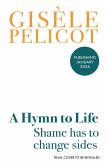For more than two years, Donna Freitas's graduate school mentor, a priest and celebrated scholar, stalked her, forever changing her life. In her 2019 account Consent: A Memoir of Unwanted Attention, she re-created, in novelistic detail, the story of being traumatized by her professor's obsession with her, of how he used his power to try to rob her of her own. Freitas's story has been hailed as "groundbreaking" (Kirkus) and "an important testament for the #MeToo era" (Publishers Weekly), "illuminat[ing] our ideas about harassment and harm" (Rebecca Traister). But readers' responses to its publication, and the author's experience of seeing the public's response, impressed upon her that there was more to be said: not from the perspective of the naive young woman she was in graduate school, but in the fully empowered voice of the woman-the writer, teacher, and Title IX researcher and lecturer-she has since become. Pulling no punches, she speaks out here, in this searing Scribd Original, in a direct address-a letter-to her stalker.
Dear Professor confronts and galvanizes. It is a public accusation and a personal confession. Above all, it is a guide to how to express and claim one's anger, to use it to good and healthy effect to explode the shame that victims of stalking often feel and the silence they are often forced into. It acknowledges the grief of what was lost through years of trauma-the life that the author's younger self had planned and invested in, including a very different kind of academic career. And it embraces what's been gained: empathy, resiliency, adaptability, clarity, and more-all highly useful ingredients, it turns out, in becoming an expert on matters of consent and in successfully pursuing a writer's life. It asks if either forgiveness or outing her stalker by name (something she's assiduously avoided in print and at her readings and lectures) is necessary to her healing. Is what her former mentor did to her or may have done to others in any way her responsibility? How much can be expected of victims of such pernicious harassment? And how can Freitas continue to protect herself and her right to choose how she overcomes?
At once intimate and incendiary, Dear Professor is an act of liberation and self-love and an invitation to others who've been victimized to accept their pain and outrage, assign fault where fault is squarely due, take pride in what must be a uniquely personal journey, and say no, and no again, to censorship, secrecy, and stigma.
Hinweis: Dieser Artikel kann nur an eine deutsche Lieferadresse ausgeliefert werden.
Dear Professor confronts and galvanizes. It is a public accusation and a personal confession. Above all, it is a guide to how to express and claim one's anger, to use it to good and healthy effect to explode the shame that victims of stalking often feel and the silence they are often forced into. It acknowledges the grief of what was lost through years of trauma-the life that the author's younger self had planned and invested in, including a very different kind of academic career. And it embraces what's been gained: empathy, resiliency, adaptability, clarity, and more-all highly useful ingredients, it turns out, in becoming an expert on matters of consent and in successfully pursuing a writer's life. It asks if either forgiveness or outing her stalker by name (something she's assiduously avoided in print and at her readings and lectures) is necessary to her healing. Is what her former mentor did to her or may have done to others in any way her responsibility? How much can be expected of victims of such pernicious harassment? And how can Freitas continue to protect herself and her right to choose how she overcomes?
At once intimate and incendiary, Dear Professor is an act of liberation and self-love and an invitation to others who've been victimized to accept their pain and outrage, assign fault where fault is squarely due, take pride in what must be a uniquely personal journey, and say no, and no again, to censorship, secrecy, and stigma.
Dieser Download kann aus rechtlichen Gründen nur mit Rechnungsadresse in A, D ausgeliefert werden.
Hinweis: Dieser Artikel kann nur an eine deutsche Lieferadresse ausgeliefert werden.









